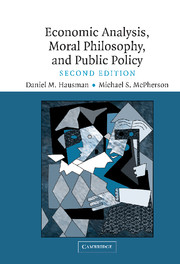Book contents
- Frontmatter
- Contents
- Preface
- INTRODUCTION
- I RATIONALITY AND MORALITY
- 4 Rationality
- 5 Rationality in Positive and Normative Economics
- 6 Rationality, Norms, and Morality
- II WELFARE AND CONSEQUENCES
- III LIBERTY, RIGHTS, EQUALITY, AND JUSTICE
- IV MORAL MATHEMATICS
- CONCLUSIONS
- Appendix: How Could Ethics Matter to Economics?
- Glossary
- References
- Index
6 - Rationality, Norms, and Morality
Published online by Cambridge University Press: 06 July 2010
- Frontmatter
- Contents
- Preface
- INTRODUCTION
- I RATIONALITY AND MORALITY
- 4 Rationality
- 5 Rationality in Positive and Normative Economics
- 6 Rationality, Norms, and Morality
- II WELFARE AND CONSEQUENCES
- III LIBERTY, RIGHTS, EQUALITY, AND JUSTICE
- IV MORAL MATHEMATICS
- CONCLUSIONS
- Appendix: How Could Ethics Matter to Economics?
- Glossary
- References
- Index
Summary
Every society has moral norms, although none can boast of perfect compliance. People approve of behavior that conforms to the dictates of their morality and disapprove of behavior that violates established moral norms. Those who violate moral norms typically experience negative feelings of guilt or shame. Moral norms enable people to coordinate their actions more efficiently than would be possible without a shared morality. It is in everyone's interest to live in a society governed by moral norms requiring that people tell the truth, keep promises, refrain from actions of violence toward others, and so forth.
Yet it can be costly to do what is morally right. If one is on a sinking ship without a life jacket, there are obvious advantages to stealing one from another person. One might feel guilty about it later, but people can get over guilt; they cannot get over death. The central character in Woody Allen's Crimes and Misdemeanors, a distinguished physician who has his mistress murdered to protect his reputation, is surprised at how easily he represses his guilt. To go to one's death in order to comply with a moral norm against theft might even appear to be irrational. Although self-interest and morality may often march in step, at a certain point their paths seem to diverge.
How compatible are morality, self-interest, and rationality? This is an old philosophical question that we cannot hope to settle, but we can explore its ramifications for economics.
- Type
- Chapter
- Information
- Economic Analysis, Moral Philosophy and Public Policy , pp. 78 - 96Publisher: Cambridge University PressPrint publication year: 2006



